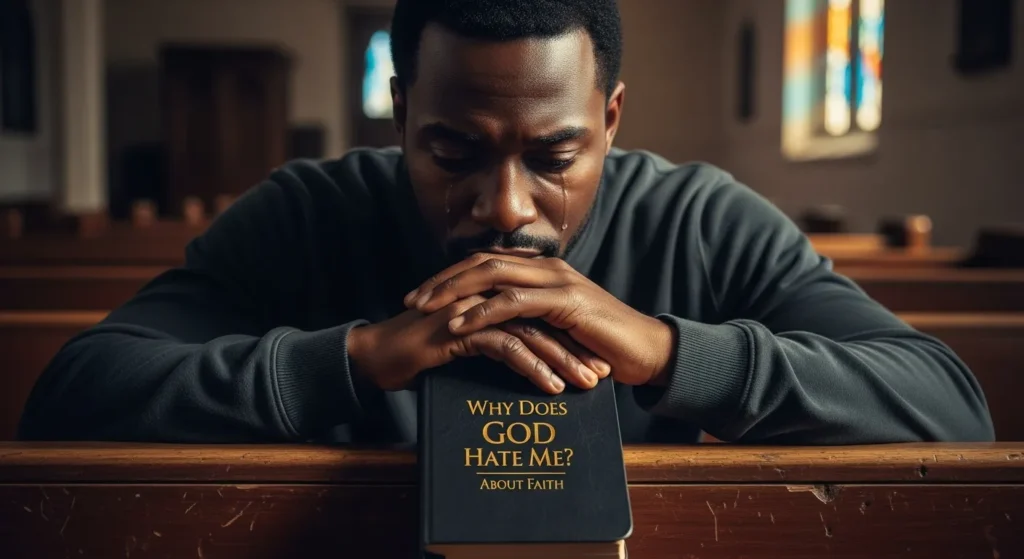- Unpacking Feelings of Divine Distance
- Personal Stories of Struggle and Pain
- Reasons Behind Doubts and Questions
- Biblical Insights on Affection and Care
- Historical Figures and Their Doubts
- Approaches to Navigating Suffering
- Steps for Dealing with Inner Turmoil
- Ways to Feel Connected and Valued
- Finding Strength in Community Support
- Overcoming Adversary's Influences
- Practical Steps to Address Doubts
- Search Trends and Cultural Context
- Embracing a Positive Outlook
- Final Thoughts
- FAQs
- References
- Author: Chang Russell
We often find ourselves pondering big questions about life and the divine, especially when things feel tough. One such query that pops up a lot is “why does god hate me,” reflecting a deep search for understanding in moments of pain.
These searches aren’t new; back in 2015, a New York Times article pointed out the top three most Googled questions about God: “Who created God?”, “Why does God allow suffering?”, and “why does god hate me.” They show how common these doubts are among people everywhere.
Unpacking Feelings of Divine Distance
I remember hearing stories from folks who feel overlooked by a higher power during hard times. They describe intense anxiety, depression, and hopelessness, like during a global crisis, leading them to ask “why does god hate me.”
Such feelings can stem from personal crises, such as the loss of a loved one or a divorce. For instance, one person shared about their sister who was 13 years old when she was killed in a car accident in 1991, sparking deep questions like “why does god hate me.”
Personal Stories of Struggle and Pain

We all know someone who’s faced ongoing bullying and betrayal for most of their lives. Growing up in a toxic household with constant criticism despite efforts can make anyone wonder “why does god hate me.”
These experiences often include “failure after failure” and sacrificing well-being for others. A scholarship at risk due to living with a toxic parent who constantly drains the individual adds to the weight, prompting thoughts of “why does god hate me.”
Reasons Behind Doubts and Questions
They say the question “why does god hate me” is often rooted in personal crises, mental health issues, or feelings of guilt and shame. To break it down, here are key categories:
- Personal Suffering & External Circumstances: Experiencing intense anxiety, depression, and hopelessness, such as during a global crisis. Feelings of being forgotten, overlooked, and uncared for by God due to life situations. Dealing with the diagnosis of a child’s complete blindness. Personal crises like the loss of a loved one, divorce, or chronic/fatal illness. Life situations that “felt as far from love as possible”. Belief that circumstances betray the idea of a loving God. Persistent bullying and betrayal for most of one’s life. Growing up in a toxic household with constant criticism despite efforts. Experiencing “failure after failure.”
- Internal Feelings & Self-Perception: Feelings of abandonment or unworthiness. Struggles with depression or anxiety where the internal narrative suggests unworthiness. Overwhelming feelings of guilt and shame, leading to a sense of being unworthy of anything but God’s hatred. Suspecting God hates one due to self-perceived flaws, like appearance, weight, or skin color. Feeling despised and vulnerable, making the question difficult to ask aloud.
- Theological & Spiritual Misunderstandings: Believing God is angry, unpleasable, or has favorites. Having a twisted idea of who God is, sometimes from manmade religion or warped Christian teachings. Insisting that God must operate on one’s own terms due to pride, and perceiving His refusal to bend as hatred. Defining oneself by a specific sin and demanding God accept it. The adversary’s aim to make one believe God does not love them, assaulting their “sonship” as a loved child of God. Believing “the lie that launches a thousand sins is that God is not a good Dad.”
Biblical Insights on Affection and Care
Does God really hate people? Despite what feelings might tell, God does not hate humanity.
Bible verses about God’s love remind us of this truth. For example, God’s love is demonstrated through sending Jesus Christ to cover sin, so that “whosoever believes in Him will not perish.”
Our sin mars the image of God, putting distance between us and Him. Pride is identified as the first sin (Isaiah 14:12–14) and a reason people believe God hates them, as it insists God must do things their way.
The Bible assures us of God’s love even in the midst of hardship or conflict. Nothing can separate us from the love of God in Jesus Christ (Romans 8:37–39), not internal worthiness nor external circumstances.
Historical Figures and Their Doubts
Many people struggle to believe God loves them, and even biblical figures like David, Jeremiah, and Jesus Himself expressed feelings of abandonment. They cried out in psalms and prayers, echoing “why does god hate me” in their own ways.
Suffering is sometimes described as a “mystery” that will only be fully understood in Heaven (2 Thessalonians 2:7, KJV). This perspective helps when we face unanswered questions like “why does god hate me.”
Approaches to Navigating Suffering

Ben Stuart’s three approaches to suffering and the question “why does god hate me” offer helpful frameworks. Here’s how they break down:
| Approach | Characteristics | Outcome |
|---|---|---|
| Pastoral (e.g., Job, Habakkuk, Lamentations) | Sitting with others in their sorrow, providing comfort through shared experience. | High comfort, but “no real answers” to the philosophical reasons for suffering. |
| Philosophical/Theological | Breaking down the reasons for God’s governance of the universe. | Provides many reasons, but “does not provide comfort.” |
| Practical Theology (e.g., Dr. Martyn Lloyd-Jones) | Like a physical therapist; focuses on activation and helping to “climb out” of the pit rather than commiserating or sitting in sorrow. | Doesn’t “feel like love” initially, but aims to activate and lead to a solution rather than just provide comfort or explanation. |
These methods show different ways to address “why does god hate me,” from emotional support to deeper thinking.
Steps for Dealing with Inner Turmoil
Ben Stuart’s three steps for dealing with the question “why does god hate me” guide us through the process. They include:
| Step | Description |
|---|---|
| 1. Be honest about the crisis. | Acknowledging sadness and being honest with God about feelings, even when enduring something “slowly and relentlessly brutal”. The psalmist’s question “When do I get to see God?” is a timing question, implying God is coming. |
| 2. Get curious about the cause. | Questioning one’s own soul and exploring potential causes of angst, such as personal temperament, physical condition, experiential highs and lows, and “constant darts of discouragement” from the adversary. |
| 3. Get serious about the cure. | Speaking back to negative voices, remembering God’s creative power even in chaos, and taking hold of oneself, the gospel, and God Himself. |
We can apply these steps when grappling with “why does god hate me” to move forward.
Ways to Feel Connected and Valued
Understanding God’s love starts with recognizing He designed human beings to reflect His own image, and He loves what He created, especially human beings. To discover God’s love, one should look to Jesus and remember the cross, which is “the ultimate sign from God that he doesn’t hate humanity.”
Here are three ways to experience God’s love for yourself:
- Observe Quietly: A non-religious exercise to gain mental space is to sit quietly and observe a work of art for at least 15 minutes.
- Visualize Joy: A religious exercise involves picturing God looking at you and then imagining God smiling at you with immense joy.
- Seek Community: Community support through friends providing meals, playing games, and family sitting in silence was profoundly impactful in experiencing God’s love.
These practices help counter the doubt of “why does god hate me.”
Finding Strength in Community Support
Christian counseling support can be a lifeline when asking “why does god hate me.” Being brutally honest about feelings with trusted friends, rather than being “bombarded with Scriptures” or told to “pray more,” was helpful in processing hurt and slowly learning to trust God again.
A mentor’s quote resonates here: “Sometimes when it feels like you’re beating on a brick wall, it’s actually God’s chest as He holds you close.” With the help of professionals, progress was made, but the fear of being overlooked by God persisted.
One individual battled intense anxiety, depression, and hopelessness during a global crisis, enduring months of overwhelming numbness and tears. The diagnosis that a son was completely blind led to feelings of betrayal, being overlooked, and disappointment in God.
Overcoming Adversary’s Influences
The adversary’s primary aim is to make sinners content (so they drift to Hell) and saints miserable (so they become a bad marketing campaign for the Kingdom). Satan constantly assaults one’s “sonship” (belief in being a dearly loved child of God) because it is the foundation for living the Christian life.
Martyn Lloyd-Jones’s insight: “Have you realized that most of your unhappiness is because you’re listening to yourself instead of talking to yourself.” This reminds us to challenge the inner voice saying “why does god hate me.”
The ancient Israelites often assumed suffering was punishment from God, but over time, they learned that “life is sometimes truly horrible” and suffering doesn’t always mean God hates them. Jesus, in the New Testament, challenged religious leaders and people who sought to execute a prostitute, but never said God hated any of them.
Practical Steps to Address Doubts

Steps to address the question “why does god hate me” involve honesty and action. Here’s a structured guide:
| Step | Description |
|---|---|
| Acknowledge Feelings | The fact that someone asks “why does god hate me” suggests they are trying to change things for themselves, seeking an explanation to end their pain. The person asking the question is brave for expressing their feelings and gives others permission to do the same. |
| Seek Resources | A prayer guide from Finds.Life.Church, “Prayers for Strength, Hope, Stress, and Everything Else You Need,” is 16 minutes long. |
| Build Habits | Speaking back to negative voices and remembering God’s love. |
These steps empower us to shift from “why does god hate me” to hope.
Search Trends and Cultural Context
When typing “Why does God” into the search bar, “why does god hate me” was the number one auto-populate result at one point and the number three question on another occasion. This highlights how widespread the query is.
Finding hope in suffering is key, as it transforms the perspective on “why does god hate me.”
Embracing a Positive Outlook
I think it’s important to remember that God doesn’t operate on our terms, but His love remains. Individuals have endured ongoing challenges, yet many find peace through faith.
Final Thoughts
We’ve explored feelings of doubt, biblical truths, personal stories, and practical steps around “why does god hate me.” Remember, understanding God’s love and finding hope in suffering can lead to healing—consider reaching out for Christian counseling support or reflecting on Bible verses about God’s love as your next step.
FAQs
Why do I feel like God hates me?
Feelings of anxiety, depression, or personal crises like loss can spark this question. God’s love remains, as shown through Jesus
Does God really hate people?
No, God loves humanity, creating us in His image. The cross shows His love, not hatred, despite our sins
Why does suffering make me feel God hates me?
Suffering feels brutal, but it’s not proof of God’s hatred. It’s a mystery, often only clear in Heaven
How can I feel God’s love when I’m struggling?
Try quiet reflection, picturing God’s smile, or seeking community support. These help counter doubts about God’s love.
What does the Bible say about God’s love?
Verses like Romans 8:37–39 assure nothing separates us from God’s love, even in hardship or personal struggles.
References
- The New York Times. (2015). The top three most Googled questions about God. [No specific article title provided in the source data].
- Finds.Life.Church. Prayers for Strength, Hope, Stress, and Everything Else You Need [Prayer guide, 16 minutes long].
- Stuart, Ben. (Source not fully specified). Three Approaches to Suffering and the Question “Why Does God Hate Me?” and Three Steps for Dealing with the Question “Why Does God Hate Me?”.
- The Holy Bible, King James Version. (n.d.).
- Isaiah 14:12–14.
- Romans 8:37–39.
- 2 Thessalonians 2:7.
- Lloyd-Jones, Martyn. (Source not fully specified). Insight on self-talk and unhappiness.
Disclamer: This article is for informational purposes only and not a substitute for professional counseling or theological advice. Consult a trusted counselor or pastor for personal guidance.
Author: Chang Russell
As an expert in family studies and child development, Chang Su-Russell emphasizes the critical role of open, sensitive caregiving in shaping young children’s socioemotional well-being amid challenging topics like death and racism.

